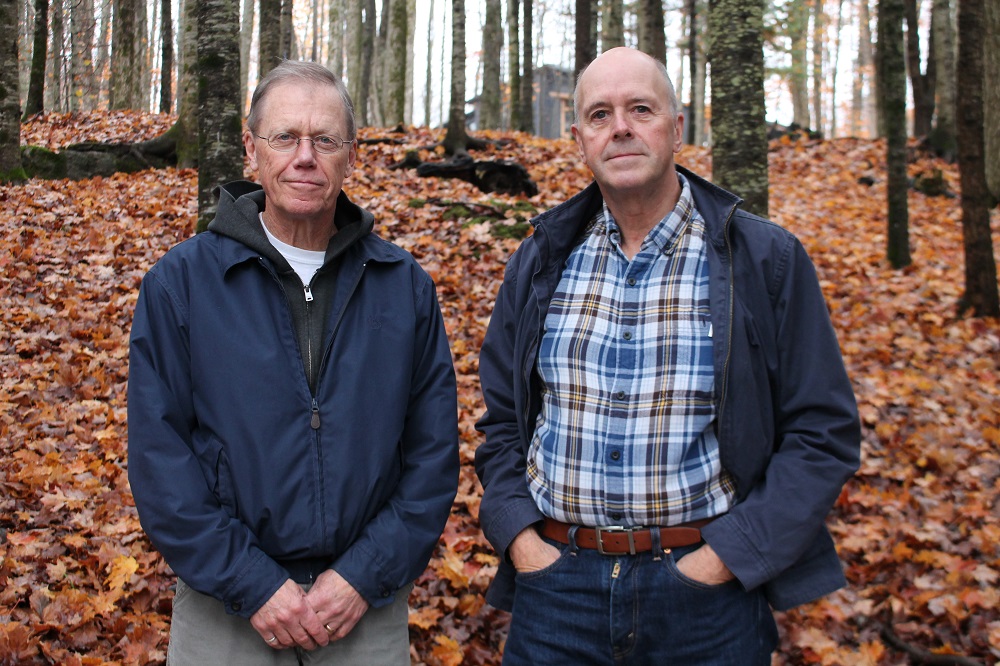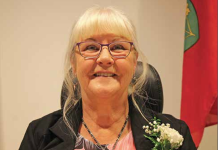When Greg Gillespie and his wife, Gail, moved to their current Haliburton home 10 years ago, Greg says they had a lot of regeneration under their mature trees. They had Hermit Thrush nesting on the property as well.
However, Greg says the deer have eaten the undergrowth and the birds have moved on.
“So, it’s not just traffic accidents,” Greg says of the deer problem in Haliburton. “It’s a whole litany of things they’re impacting.”
As if on cue, a deer walks into the forest behind Gillespie’s house, visible through the living-room window where he and Chris Bishop are sitting on a couch.
The two are behind the Stop Deer Feeding Property Owners Coalition. They made a delegation to Dysart et al’s Oct. 24 council meeting, calling for an immediate, year-round, ban on deer feeding in the Haliburton settlement area. They came armed with a 720-name petition
Council is expected to formalize a bylaw at its November meeting.
Gillespie said he was concerned with talk of the ban only being for Ward 1, since they want the settlement area included, and the section north of Harburn Road, up to the area around Country Rose.
“If it wasn’t for Pat Casey stepping in with a very timely refocus on what we’re trying to do here I’m not sure what would have happened and then there was confusion about the map…” Gillespie says.
In the end, Gillespie and Bishop said council appeared to get to where they wanted them to go
“If they do the coverage area that we presented in the map, we’re happy with that,” Bishop said. “It’s a starting point, that’s for sure.”
The coalition had also asked that notice of the bylaw be posted at feed stores, as well as attaching their research paper ‘consequences of deer feeding in urban areas’ to the bylaw. However, they conceded council could not do the two minor asks.
“But the key is education,” Gillespie says. “Notification of the bylaw, and education of why the bylaw is there in the first place.” He added it sounded as if council was conducive to doing that.
Bishop said he would like education on the township website, and an insert with tax bills.
“If they don’t educate the people, and people don’t know that they’re not supposed to be feeding them, people will feed them,” Bishop said.
He added when someone complains, he is okay with a first-time warning.
Gillespie said they want a ban first, then enforcement, then possibly a County-wide ban.
‘They’re not afraid’
“You read all of the consequences of feeding deer. It is absolutely amazing to me that the Ministry of Natural Resources, the Ontario government, hasn’t stepped in to legislate against it. They’ve got reams of information on their website and yet they leave it to the municipalities to deal with, if there’s a problem. I just can’t understand it,” Gillespie said.
Bishop said they went door-to-door to collect the signatures and encountered a lot of domesticated deer. At one property, he said he was told the feeder gets up to 30 deer at a time. He added he does not buy the argument that people are hitting deer with vehicles because they are speeding.
They’re (deer) not afraid. That’s why they walk out on the road in front of you.”
He added because they are being fed in winter, fewer deer are dying, which does not allow for natural control of the population.
Gillespie said the pro-feeders are bringing the emotional side of the debate, “which is powerful.” He added they are arguing for private property rights. “But we have property rights too.”
For example, he said he and Gail can’t use their property in the spring when doing maple syrup because their paths are paved with droppings and buckets have deer hair in them. They added people’s gardens are being decimated.
Nor do they want the bylaw phased in. “We have to deal with this issue now or next year it’s going to be even worse. The sooner we start, the sooner we get it resolved,” Gillespie said.
Bishop added, “the deer are going to die. They always do die in the winter. Yes, the first couple of years, there will be more carcasses. That is nature’s way and the reason that’s going to happen is you fed them. People who are feeding them need to take responsibility because they are the ones causing all the problems.”





